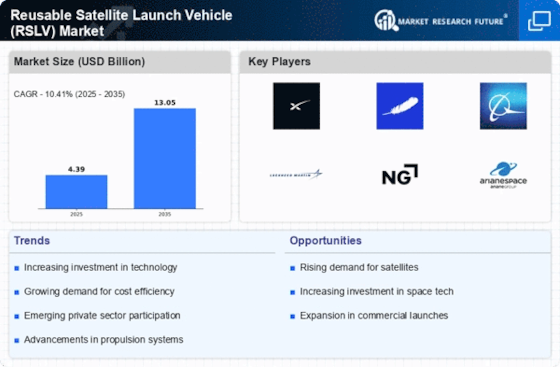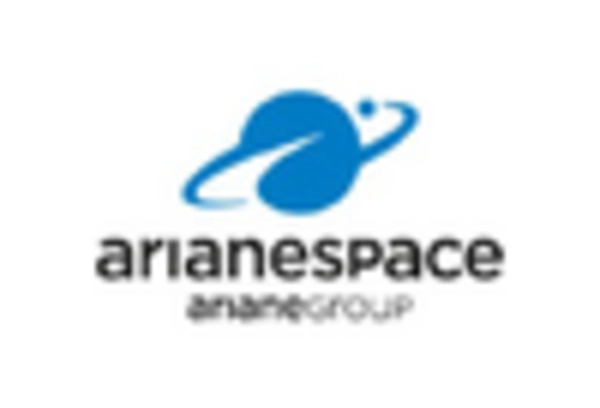-
Executive Summary
-
Market Attractiveness Analysis
-
Global Reusable
-
Satellite Launch Vehicle Market, by Type
-
Global Reusable
-
Satellite Launch Vehicle Market, by Configuration
-
Global
-
Reusable Satellite Launch Vehicle Market, by Vehicle Weight
-
Global Reusable Satellite Launch Vehicle Market, by Region
-
Market Introduction
-
Market Definition
-
Scope of the Study
-
Market Structure
-
Key Buying Criteria
-
Market Factor Indicator Analysis
-
Research Methodology
-
Research
-
Process
-
Primary Research
-
Secondary
-
Research
-
Market Size Estimation
-
Forecast Model
-
List of Assumptions
-
Market Insights
-
Market Dynamics
-
Introduction
-
Drivers
-
Restraints
-
Opportunities
-
Market/Technological
-
Trends
-
Patent Trends
-
Regulatory
-
Landscape/Standards
-
Market Factor Analysis
-
Value Chain/Supply Chain Analysis
-
& Sales
-
Porter’s Five Forces Analysis
-
New Entrants
-
Threat of Substitutes
-
Bargaining Power of Supplies
-
R&D
-
Manufacturing
-
Distribution
-
Post-Sales Monitoring
-
Threat of
-
Bargaining Power of Buyers
-
Segment Rivalry
-
Global Reusable Satellite
-
Launch Vehicle Market, by Type
-
Introduction
- Market Estimates & Forecast,
- Market Estimates & Forecast, by
-
Partially Reusable
-
Region, 2024–2032
-
Fully Reusable
- Market
-
Market Estimates & Forecast, 2024–2032
-
Estimates & Forecast, by Region, 2024–2032
-
Global
-
Reusable Satellite Launch Vehicle Market, by Configuration
-
Introduction
-
Single Stage
- Market
-
Market Estimates & Forecast, 2024–2032
-
Estimates & Forecast, by Region, 2024–2032
-
Multiple
- Market Estimates & Forecast, 2024–2032
- Market Estimates & Forecast, by Region, 2024–2032
-
Stage
-
Global Reusable Satellite Launch Vehicle Market, by Vehicle
-
Weight
-
Introduction
-
Up to
- Market Estimates & Forecast, 2024–2032
- Market Estimates & Forecast, by Region, 2024–2032
-
4,000lbs
-
4000-9000lbs
- Market Estimates
- Market Estimates &
-
& Forecast, 2024–2032
-
Forecast, by Region, 2024–2032
-
Over 9000lbs
- Market Estimates & Forecast, 2024–2032
-
Market Estimates & Forecast, by Region, 2024–2032
-
Global Reusable Satellite Launch Vehicle Market, by Region
-
Introduction
-
North America
-
Market Estimates & Forecast, by Country, 2024–2032
-
Market Estimates & Forecast, by Type, 2024–2032
-
Market Estimates & Forecast, by Configuration, 2024–2032
-
Market Estimates & Forecast, by Vehicle Weight, 2024–2032
-
US
-
by Configuration, 2024–2032
-
& Forecast, by Vehicle Weight, 2024–2032
-
by Vehicle Weight, 2024–2032
-
Market Estimates & Forecast, by Type,
-
Market Estimates & Forecast,
-
Market Estimates
-
Canada
-
Market Estimates & Forecast, by Type, 2024–2032
-
Market Estimates & Forecast, by Configuration,
-
Market Estimates & Forecast,
-
Europe
-
Market Estimates & Forecast, by Country, 2024–2032
-
Market Estimates & Forecast, by Type, 2024–2032
-
Market Estimates & Forecast, by Configuration, 2024–2032
-
Market Estimates & Forecast, by Vehicle Weight, 2024–2032
-
UK
-
by Configuration, 2024–2032
-
& Forecast, by Vehicle Weight, 2024–2032
-
by Vehicle Weight, 2024–2032
-
Market Estimates & Forecast, by Type,
-
Market Estimates & Forecast,
-
Market Estimates
-
Germany
-
Market Estimates & Forecast, by Type, 2024–2032
-
Market Estimates & Forecast, by Configuration,
-
Market Estimates & Forecast,
-
France
-
Market Estimates & Forecast, by Type, 2024–2032
-
Market Estimates & Forecast, by Configuration, 2024–2032
-
Market Estimates & Forecast, by Vehicle Weight, 2024–2032
-
Italy
-
Type, 2024–2032
-
by Configuration, 2024–2032
-
& Forecast, by Vehicle Weight, 2024–2032
-
of Europe
-
by Configuration, 2024–2032
-
& Forecast, by Vehicle Weight, 2024–2032
-
Market Estimates & Forecast, by
-
Market Estimates & Forecast,
-
Market Estimates
-
Rest
-
Market Estimates & Forecast, by Type,
-
Market Estimates & Forecast,
-
Market Estimates
-
Asia-Pacific
- Market Estimates & Forecast, by Country, 2024–2032
- Market Estimates & Forecast, by Type, 2024–2032
- Market Estimates & Forecast, by Configuration, 2024–2032
- Market Estimates & Forecast, by Vehicle Weight,
- China
-
Market Estimates & Forecast, by Type, 2024–2032
-
Market Estimates & Forecast, by Configuration, 2024–2032
-
Market Estimates & Forecast, by Vehicle Weight, 2024–2032
-
Japan
-
Type, 2024–2032
-
by Configuration, 2024–2032
-
& Forecast, by Vehicle Weight, 2024–2032
-
by Vehicle Weight, 2024–2032
-
Market Estimates & Forecast, by
-
Market Estimates & Forecast,
-
Market Estimates
-
India
-
Market Estimates & Forecast, by Type, 2024–2032
-
Market Estimates & Forecast, by Configuration,
-
Market Estimates & Forecast,
-
Australia
-
Market Estimates & Forecast, by Type, 2024–2032
-
Market Estimates & Forecast, by Configuration, 2024–2032
-
Market Estimates & Forecast, by Vehicle Weight, 2024–2032
-
Rest of Asia-Pacific
-
Forecast, by Type, 2024–2032
-
& Forecast, by Configuration, 2024–2032
-
Estimates & Forecast, by Vehicle Weight, 2024–2032
-
Middle East & Africa
-
Forecast, by Country, 2024–2032
-
& Forecast, by Type, 2024–2032
-
& Forecast, by Configuration, 2024–2032
-
Estimates & Forecast, by Vehicle Weight, 2024–2032
-
Saudi Arabia
-
by Type, 2024–2032
-
Forecast, by Configuration, 2024–2032
-
Estimates & Forecast, by Vehicle Weight, 2024–2032
-
UAE
-
by Configuration, 2024–2032
-
& Forecast, by Vehicle Weight, 2024–2032
-
of Middle East & Africa
-
Forecast, by Type, 2024–2032
-
& Forecast, by Configuration, 2024–2032
-
Estimates & Forecast, by Vehicle Weight, 2024–2032
-
Latin America
-
by Country, 2024–2032
-
Forecast, by Type, 2024–2032
-
& Forecast, by Configuration, 2024–2032
-
Estimates & Forecast, by Vehicle Weight, 2024–2032
-
Brazil
-
Type, 2024–2032
-
by Configuration, 2024–2032
-
& Forecast, by Vehicle Weight, 2024–2032
-
of Latin America
-
by Type, 2024–2032
-
Forecast, by Configuration, 2024–2032
-
Estimates & Forecast, by Vehicle Weight, 2024–2032
-
Competitive Landscape
-
Growth Strategies in the Global Reusable Satellite Launch Vehicle Market
-
Competitive Benchmarking
-
Reusable Satellite Launch Vehicle Market
-
& Growth Strategies
-
Ventures
-
Market Estimates &
-
Market Estimates
-
Market
-
Market Estimates &
-
Market Estimates
-
Market Estimates
-
Market
-
Market Estimates & Forecast,
-
Market Estimates &
-
Market
-
Market Estimates & Forecast, by Type,
-
Market Estimates & Forecast,
-
Market Estimates
-
Rest
-
Market Estimates &
-
Market Estimates
-
Market
-
Market Estimates & Forecast,
-
Market Estimates &
-
Market Estimates
-
Market
-
Market Estimates & Forecast, by
-
Market Estimates & Forecast,
-
Market Estimates
-
Rest
-
Market Estimates & Forecast,
-
Market Estimates &
-
Market
-
Competitive Overview
-
Competitor Dashboard
-
Major
-
Market Share Analysis
-
Leading Player in Terms of Number of Developments in Global
-
Key Developments
- Product Launch/Service Deployment
- Mergers and Acquisitions
- Joint
-
Company Profiles
-
Bigelow
- Company Overview
- Products Offered
- SWOT Analysis
-
Aerospace
-
Financial Overview
-
Key Developments
-
Key Strategies
-
Airbus SAS
- Financial Overview
- Key Developments
- Key Strategies
- Company Overview
- Products Offered
- SWOT Analysis
-
Company Overview
-
Products Offered
-
SWOT Analysis
-
Boeing
-
Financial Overview
-
Key Developments
-
Key Strategies
-
Bellatrix Aerospace Private Limited
- Company Overview
- Financial
- Products Offered
- SWOT Analysis
-
Overview
-
Key Developments
-
Key Strategies
-
Lockheed Martin Corporation
- Company Overview
- Financial
- Products Offered
- SWOT Analysis
-
Overview
-
Key Developments
-
Key Strategies
-
Masten Space Systems
- Financial Overview
- Key Developments
- Key Strategies
- Company
- Financial Overview
- Key Developments
- Key Strategies
- Company Overview
- Financial Overview
- Products
- Key Developments
- SWOT
- Key Strategies
-
Company Overview
-
Products Offered
-
SWOT Analysis
-
Space Exploration Technologies Corp.
-
Overview
-
Products Offered
-
SWOT Analysis
-
Sierra Nevada Corporation
-
Offered
-
Analysis
-
Virgin
- Company Overview
- Products Offered
- SWOT Analysis
-
Galactic
-
Financial Overview
-
Key Developments
-
Key Strategies
-
Appendix
-
References
-
Related Reports
-
List of Abbreviation
-
List of Tables
-
List
-
of Assumptions
-
Major Patents Granted For Directed
-
Energy Weapon
-
Type: Global Reusable Satellite Launch
-
Vehicle Market, 2024–2032 (USD Million)
-
Configuration:
-
Global Reusable Satellite Launch Vehicle Market, 2024–2032 (USD Million)
-
Vehicle Weight: Global Reusable Satellite Launch Vehicle
-
Market, 2024–2032 (USD Million)
-
Global Reusable
-
Satellite Launch Vehicle Market, by Region, 2024–2032 (USD Million)
-
TABLE
-
North America: Reusable Satellite Launch Vehicle Market, by
-
country, 2024–2032 (USD Million)
-
North America:
-
Reusable Satellite Launch Vehicle Market, by Type, 2024–2032 (USD Million)
-
North America: Reusable Satellite Launch Vehicle Market,
-
by Configuration, 2024–2032 (USD Million)
-
North
-
America: Reusable Satellite Launch Vehicle Market, by Vehicle Weight, 2024–2032
-
(USD Million)
-
US: Reusable Satellite Launch Vehicle
-
Market, by Type, 2024–2032 (USD Million)
-
US:
-
Reusable Satellite Launch Vehicle Market, by Configuration, 2024–2032 (USD
-
Million)
-
US: Reusable Satellite Launch Vehicle Market,
-
by Vehicle Weight, 2024–2032 (USD Million)
-
Canada:
-
Reusable Satellite Launch Vehicle Market, by Type, 2024–2032 (USD Million)
-
Canada: Reusable Satellite Launch Vehicle Market, by
-
Configuration, 2024–2032 (USD Million)
-
Canada:
-
Reusable Satellite Launch Vehicle Market, by Vehicle Weight, 2024–2032 (USD
-
Million)
-
Europe: Reusable Satellite Launch Vehicle
-
Market, by Country, 2024–2032 (USD Million)
-
Europe:
-
Reusable Satellite Launch Vehicle Market, by Type, 2024–2032 (USD Million)
-
Europe: Reusable Satellite Launch Vehicle Market, by
-
Configuration, 2024–2032 (USD Million)
-
Europe:
-
Reusable Satellite Launch Vehicle Market, by Vehicle Weight, 2024–2032 (USD
-
Million)
-
UK: Reusable Satellite Launch Vehicle Market,
-
by Type, 2024–2032 (USD Million)
-
UK: Reusable
-
Satellite Launch Vehicle Market, by Configuration, 2024–2032 (USD Million)
-
UK: Reusable Satellite Launch Vehicle Market, by Vehicle
-
Weight, 2024–2032 (usd Million)
-
Germany: Reusable
-
Satellite Launch Vehicle Market, by Type, 2024–2032 (usd Million)
-
TABLE
-
Germany: Reusable Satellite Launch Vehicle Market, by Configuration,
-
Germany: Reusable
-
Satellite Launch Vehicle Market, by Vehicle Weight, 2024–2032 (usd Million)
-
France: Reusable Satellite Launch Vehicle Market, by
-
Type, 2024–2032 (usd Million)
-
France: Reusable
-
Satellite Launch Vehicle Market, by Configuration, 2024–2032 (usd Million)
-
France: Reusable Satellite Launch Vehicle Market, by
-
Vehicle Weight, 2024–2032 (usd Million)
-
Italy:
-
Reusable Satellite Launch Vehicle Market, by Type, 2024–2032 (usd Million)
-
Italy: Reusable Satellite Launch Vehicle Market, by
-
Configuration, 2024–2032 (usd Million)
-
Italy:
-
Reusable Satellite Launch Vehicle Market, by Vehicle Weight, 2024–2032 (usd
-
Million)
-
Rest of Europe: Reusable Satellite Launch
-
Vehicle Market, by Type, 2024–2032 (USD Million)
-
TABLE 34
-
Rest of Europe: Reusable Satellite Launch Vehicle Market, by Configuration,
-
Rest of Europe: Reusable
-
Satellite Launch Vehicle Market, by Vehicle Weight, 2024–2032 (USD Million)
-
Asia-Pacific: Reusable Satellite Launch Vehicle Market,
-
by Country, 2024–2032 (USD Million)
-
Asia-Pacific:
-
Reusable Satellite Launch Vehicle Market, by Type, 2024–2032 (USD Million)
-
Asia-Pacific: Reusable Satellite Launch Vehicle Market,
-
by Configuration, 2024–2032 (USD Million)
-
Asia-Pacific:
-
Reusable Satellite Launch Vehicle Market, by Vehicle Weight, 2024–2032 (USD
-
Million)
-
China: Reusable Satellite Launch Vehicle
-
Market, by Type, 2024–2032 (USD Million)
-
China:
-
Reusable Satellite Launch Vehicle Market, by Configuration, 2024–2032 (USD
-
Million)
-
China: Reusable Satellite Launch Vehicle
-
Market, by Vehicle Weight, 2024–2032 (USD Million)
-
TABLE 43
-
India: Reusable Satellite Launch Vehicle Market, by Type, 2024–2032
-
(USD Million)
-
India: Reusable Satellite Launch Vehicle
-
Market, by Configuration, 2024–2032 (USD Million)
-
TABLE 45
-
India: Reusable Satellite Launch Vehicle Market, by Vehicle Weight, 2024–2032
-
(USD Million)
-
Japan: Reusable Satellite Launch Vehicle
-
Market, by Type, 2024–2032 (USD Million)
-
Japan:
-
Reusable Satellite Launch Vehicle Market, by Configuration, 2024–2032 (USD
-
Million)
-
Japan: Reusable Satellite Launch Vehicle
-
Market, by Vehicle Weight, 2024–2032 (USD Million)
-
TABLE 49
-
Australia: Reusable Satellite Launch Vehicle Market, by Type, 2024–2032
-
(USD Million)
-
Australia: Reusable Satellite Launch
-
Vehicle Market, by Configuration, 2024–2032 (USD Million)
-
TABLE 51
-
Australia: Reusable Satellite Launch Vehicle Market, by Vehicle Weight, 2024–2032
-
(USD Million)
-
Rest of Asia-Pacific: Reusable Satellite
-
Launch Vehicle Market, by Type, 2024–2032 (USD Million)
-
TABLE 53
-
Rest of Asia-Pacific: Reusable Satellite Launch Vehicle Market, by Configuration,
-
Rest
-
of Asia-Pacific: Reusable Satellite Launch Vehicle Market, by Vehicle Weight, 2024–2032
-
(USD Million)
-
Middle East &
-
Africa: Reusable Satellite Launch Vehicle Market, by Country, 2024–2032 (USD
-
Million)
-
Middle East & Africa: Reusable Satellite
-
Launch Vehicle Market, by Type, 2024–2032 (USD Million)
-
TABLE 57
-
Middle East & Africa: Reusable Satellite Launch Vehicle Market, by Configuration,
-
Middle
-
East & Africa: Reusable Satellite Launch Vehicle Market, by Vehicle Weight,
-
Saudi
-
Arabia: Reusable Satellite Launch Vehicle Market, by Type, 2024–2032 (USD
-
Million)
-
Saudi Arabia: Reusable Satellite Launch
-
Vehicle Market, by Configuration, 2024–2032 (USD Million)
-
TABLE 61
-
Saudi Arabia: Reusable Satellite Launch Vehicle Market, by Vehicle Weight,
-
UAE: Reusable Satellite
-
Launch Vehicle Market, by Type, 2024–2032 (USD Million)
-
TABLE 63
-
UAE: Reusable Satellite Launch Vehicle Market, by Configuration, 2024–2032
-
(USD Million)
-
UAE: Reusable Satellite Launch Vehicle
-
Market, by Vehicle Weight, 2024–2032 (USD Million)
-
TABLE 65
-
Rest of the Middle East & Africa: Reusable Satellite Launch Vehicle Market,
-
by Type, 2024–2032 (USD Million)
-
TABLE 66
-
Rest of the Middle East & Africa: Reusable Satellite Launch Vehicle Market,
-
by Configuration, 2024–2032 (USD Million)
-
TABLE 67
-
Rest of the Middle East & Africa: Reusable Satellite Launch Vehicle Market,
-
by Vehicle Weight, 2024–2032 (USD Million)
-
TABLE 68
-
Latin America: Reusable Satellite Launch Vehicle Market, by Country, 2024–2032
-
(USD Million)
-
Latin America: Reusable Satellite
-
Launch Vehicle Market, by Type, 2024–2032 (USD Million)
-
TABLE 70
-
Latin America: Reusable Satellite Launch Vehicle Market, by Configuration,
-
Latin America: Reusable
-
Satellite Launch Vehicle Market, by Vehicle Weight, 2024–2032 (USD Million)
-
Brazil: Reusable Satellite Launch Vehicle Market, by
-
Type, 2024–2032 (USD Million)
-
Brazil: Reusable
-
Satellite Launch Vehicle Market, by Configuration, 2024–2032 (USD Million)
-
Brazil: Reusable Satellite Launch Vehicle Market, by
-
Vehicle Weight, 2024–2032 (USD Million)
-
Rest
-
of Latin America: Reusable Satellite Launch Vehicle Market, by Type, 2024–2032
-
(USD Million)
-
Rest of Latin America: Reusable Satellite
-
Launch Vehicle Market, by Configuration, 2024–2032 (USD
-
Million)
-
Rest of Latin America: Reusable Satellite
-
Launch Vehicle Market, by Vehicle Weight, 2024–2032 (USD
-
Million)
-
The most active players in the global Reusable
-
Satellite Launch Vehicle Market
-
Contracts and Agreements
-
Mergers and Acquisitions
-
TABLE 81
-
Product Development
-
Expansions and Investments
-
Joint Ventures and Partnerships
-
List of Figures
-
Market Synopsis
-
Global
-
Reusable Satellite Launch Vehicle Market: Market Attractiveness Analysis
-
Figure
-
Global Reusable Satellite Launch Vehicle Market Analysis, by
-
Type
-
Global Reusable Satellite Launch Vehicle Market
-
Analysis, by Configuration
-
Global Reusable Satellite
-
Launch Vehicle Market Analysis, by Vehicle Weight
-
Global
-
Reusable Satellite Launch Vehicle Market Analysis, by Region
-
Figure 7
-
Global Reusable Satellite Launch Vehicle Market: Market Structure
-
Figure
-
Key Buying Criteria for Space System
-
Figure 9
-
Research Process of MRFR
-
North America: Market
-
Size & Market Share, by Country, 2024-2032
-
Europe:
-
Market Size & Market Share, by Country, 2024-2032
-
Figure 12
-
Asia-Pacific: Market Size & Market Share, by Country, 2024-2032
-
Figure
-
Middle East & Africa: Market Size & Market Share, by
-
Country, 2024-2032
-
Latin America: Market Size &
-
Market Share, by region, 2024-2032
-
Market Dynamics
-
Overview
-
Growth in International Seaborne Trade
-
(1970–2024)
-
Space Activities, by Region,
-
Drivers Impact Analysis: Global Reusable Satellite
-
Launch Vehicle Market
-
Restraints Impact Analysis:
-
Global Reusable Satellite Launch Vehicle Market
-
Global
-
Reusable Satellite Launch Vehicle Market: (in Millions) 2023-2032
-
Figure 21
-
Porter’s Five Forces Analysis of the Global Reusable Satellite Launch
-
Vehicle Market
-
Supply Chain: Global Reusable Satellite
-
Launch Vehicle Market
-
Global Reusable Satellite
-
Launch Vehicle Market Share, by Type, 2024 (% Share)
-
Figure 24
-
Global Reusable Satellite Launch Vehicle Market Share, by Component, 2024
-
(% Share)
-
Global Reusable Satellite Launch Vehicle
-
Market Share, by Vehicle Weight, 2024 (% Share)
-
Global
-
Reusable Satellite Launch Vehicle Market Share, by Region, 2024 (% Share)
-
Figure
-
North America: Reusable Satellite Launch Vehicle Market Share,
-
by Country, 2024 (% Share)
-
Europe: Reusable Satellite
-
Launch Vehicle Market Share, by Country, 2024 (% Share)
-
Figure 29
-
Asia-Pacific: Reusable Satellite Launch Vehicle Market Share, by Country,
-
Middle East & Africa: Reusable
-
Satellite Launch Vehicle Market Share, by Country, 2024 (% Share)
-
Figure 31
-
Latin America: Reusable Satellite Launch Vehicle Market Share, by Country,
-
Competitor Dashboard: Global Reusable
-
Satellite Launch Vehicle Market
-
Capital Market
-
Ratio and Financial Matrix
-
Contracts & Agreements:
-
The Major Strategies Adopted by Key Players in the Global Reusable Satellite
-
Launch Vehicle Market
-
Benchmarking of Major
-
Competitors
-
Major Manufacturers Market Share Analysis,


















Leave a Comment